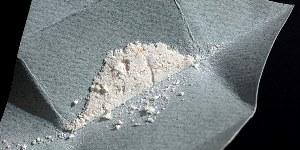The synthetic opioid fentanyl isn't just killing American drug users by the thousands. Its emergence also signals a shift in the decades-old contours of the global drug trade, with ramifications not only for traditional drug-producing countries and drug trafficking networks but also for US foreign policy.

Illicit fentanyl is typically mixed with other opiates, such as heroin, resulting in much stronger doses of opioids than users expect, thus leading to opioid overdoses. But it is also increasingly also showing up in non-opiate drugs, resulting in fentanyl overdose deaths among unsuspecting methamphetamine and cocaine users.
But the havoc super-potent fentanyl is wreaking among drug users pales in comparison with the dramatic changes it could prompt in the global illicit drug production industry. As academic researchers Vanda Felbab-Brown, Jonathan Caulkins, and Keith Humphreys write in the current issue of Foreign Affairs, fentanyl's rise has the potential to cause disruption and innovation in black markets.
Here are four ways fentanyl alters the illegal drug production and distribution status quo:
1. It doesn't require an agricultural base. Virtually all of the other opioids on the black market, from heroin to morphine, oxycodone, and hydrocodone, require land to grow poppies on. And they require land that is outside cdthe effective control of the state. Non-state actors who can control such areas, whether it's the Taliban in Afghanistan or the drug cartels in southern and western Mexico, reap the profits and power of that control. With the ascent of lab-produced fentanyl made out of chemicals, traditional opiate producers should see their profits and their influence undermined.
2. It doesn't require a large workforce. Traditional opium production requires a large seasonal workforce of people to plant and tend the poppies, score the pods and scrape off the leaking opium, and then process and package the raw opium. Other workers will get jobs processing raw opium into heroin. All of those jobs bring money into the hands of poor agricultural families and political capital to the traffickers, whether it's the Taliban in Afghanistan or the cartels in Mexico. With fewer job opportunities to offer up, the traffickers lose clout.
3. It doesn't require an elaborate smuggling infrastructure. Because fentanyl is so potent, small amounts of the drug can contain huge numbers of doses, and that means it doesn't require transportation networks of trucks, planes, and boats to get an agricultural crop from the valleys of Afghanistan or the mountains of Mexico to consumers in the US Fentanyl is so potent, medicinal doses are measured in micrograms, and packages of it worth hundreds of thousands of dollars can fit inside a Priority Mail envelope. With smuggling fentanyl as easy as dropping a package in the mail, international drug smuggling organizations now have competition they never had before.
4. All of this can change the dynamics of US foreign policy. If plant-based opiates lose market share to synthetics in the future, this can weaken both insurgencies (Afghanistan) and criminal networks (Mexico). Ever since the US invasion of Afghanistan in 2001, drug warriors have been constrained in their efforts to go after the Afghan opium crops because of fears it would drive poppy-dependent peasants into the hands of the Taliban. If opium production becomes relatively less important vis-Ã -vis fentanyl production, that constraint on an aggressive US response to Afghan opium production is weakened. Similarly, in Mexico, to the degree that fentanyl displaces peasants and processors and weakens the link between drug cartels and rural populations, it increases the ability of the Mexican government and its American backers to crack down even harder on the cartels.
Under drug prohibition, there is a strong impetus to come up with more pure, more potent, and more compact products. Fentanyl is the ultimate expression of that imperative, and its arrival is changing the contours of the global drug industry. Who knows how it will play out?
This work by StoptheDrugWar.org is licensed under Creative Commons Attribution-ShareAlike 4.0 International
Comments
Fentanyl in Meth??? Well
In reply to Fentanyl in Meth??? Well by Ricky L Allen (not verified)
You've missed the point
You've missed the point completely.
Please reread
Fentanyl
This situation, in and of itself, is hardly new. "Spice" and a few others have come and gone. A great deal of chemical crap, both legal and illegal, is bad for ya.
Rise of fentanyl strengths the case for replacing prohibition
As black market drugs get deadlier, the ability to save lives by regulated distribution of drugs of known potency and purity increases. We might get there eventually, but how many lives will be lost before we do? More than I want to think about.
thanks
thanks
Add new comment